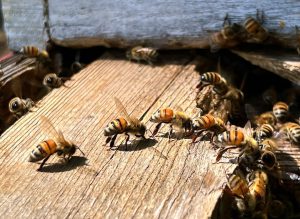By: Marissa Hermanson
Honeybee colonies have been dying more frequently in recent years than they used to, in large part because of a phenomenon commonly known as colony collapse disorder. Parasites and the stresses caused by commercial beekeeping practices have contributed to the problem, according to Thomas D. Seeley, a retired Cornell University professor who studies the behavior and social life of honeybees.
“It used to be a beekeeper would expect to lose 10 to 20 percent of colonies in a year, mostly over the winter,” he says. “And now the colony mortality can be 80 percent.”
Bees have been around for about 120 million years, though, says Brenda Kiessling, a retired physician and an Eastern Apicultural Society of North America-certified master beekeeper living in Vienna, Va. They have proven themselves capable of adjusting to changing conditions. “They have survived on their own and they have had to adapt,” says Kiessling, who has been caring for honeybees since the early 1970s. “They’ve lived through ice ages, rainstorms. Somehow they have survived.”
That knowledge has led Seeley, along with Kiessling and other researchers and amateur beekeepers, to embrace Darwinian beekeeping over the past decade. Once a niche practice, it is becoming more popular with hobbyists. It focuses on creating optimal conditions for bees to make honey, while also mimicking how Apis mellifera lives in the wild. That means housing colonies in small hives that replicate the size of a natural nest cavity, spacing hives far apart to prevent the spread of parasites from one colony to another, and positioning them far from areas treated with insecticides.
Kiessling has been following these guidelines with the bees she keeps at Sandy Spring Gardens in Ashton, Md., for the past three years. But first, she spent nearly a decade reading and researching, including by listening to several of Seeley’s lectures on the practice.
We are here to share current happenings in the bee industry. Bee Culture gathers and shares articles published by outside sources. For more information about this specific article, please visit the original publish source: Could ‘Darwinian beekeeping’ help save honeybee colonies? – The Washington Post







